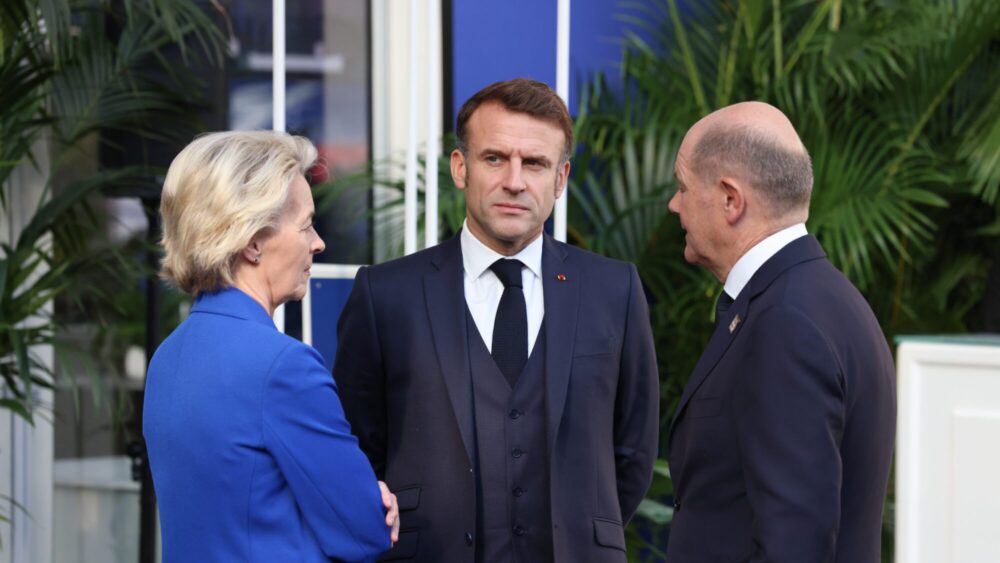
EU Commission President Ursula von der Leyen, French President Emmanuel Macron, and German Chancellor Olaf Scholz.
Photo: European Council
The second von der Leyen administration was sworn in less than three weeks ago, but the Commission chief is already off to a bad start. The final European Union Council Summit (EUCO) of the year, on Thursday December 19th, is expected to be a run-of-the-mill gathering with no big or controversial debate on the table—in contrast to the informal and secretive discussion taking place outside the meeting chamber.
“The real conversation will be about von der Leyen, and how far she can go,” an unnamed source told EU house journal Politico, which leveraged its insider connections to gauge the temperature in the room ahead of the summit.
According to several diplomats, EU member states are running out of patience with von der Leyen unilaterally taking more and more initiatives in their stead. The leaders expect the new European Council president, António Costa to step up and rein in the rogue Commission chief—reminding her that she’s not the ‘queen’ of the EU but an extension of its member states, meaning she should represent the consensus position without taking sides.
“Von der Leyen went further than any Commission president before in the interpretation of her mandate, most recently with the Mercosur decision,” another official declared, while also wishing to remain anonymous.
At the moment, the French are particularly annoyed with von der Leyen after the Commission chief decided to unilaterally rubber-stamp the controversial Mercosur deal—a giant free trade agreement between the EU and Latin-American countries—earlier this month, despite heavy opposition from a coalition of countries led by France.
Paris is rightly afraid that the devastating impact of cheap South American produce could ignite the fury of the French farming community. Countries such as Poland, Austria, Ireland, and the Netherlands also share this position, with the wildcard being Italy, whose eventual decision will likely decide the fate of the deal.
While nothing is decided yet—and with Mercosur not even on the table for discussion at this EUCO as it first needs parliamentary approval—the outrage about von der Leyen’s modus operandi is very much in the air. Going behind countries’ backs, making deals without the certainty of majority support, and later presenting them as facts—it all rightly anger leaders across Europe.
In contrast to France and its allies, Mercosur is strongly supported by Germany and other industrial hotshots who see it as a lifeline to significantly increase their global exports. However, this doesn’t mean that Germany is pleased with von der Leyen’s approach. Berlin was just as outraged when the Commission chief slapped enormous duties on Chinese electric vehicle imports earlier this year without properly consulting with member states first.
“She steamrolls through decisions,” another diplomat remarked, referring to both Mercosur and the EV duties. Equally unhappy is French MEP Christophe Grudler:
She can’t go on for five years doing one move to the right, one move to the left, or one move to a particular country. She has to play the consensus card, not go head to head with this or that country, but rather to convince them.
Von der Leyen became known for her tight grip on the decision-making process even during the previous mandate, with member states accusing her of diluting key portfolios and dividing them across multiple offices so the final decisions on the most important files would always fall to her. She seems to have doubled down on this approach with her new portfolio distribution, many of which are designed to overlap and are given to people with less political experience who are unlikely to be bold enough to challenge her.
The situation is made worse by the fact that the most powerful EU countries—such as France and Germany—are preoccupied with domestic instability and von der Leyen doesn’t seem to shy away from taking advantage of that.
Understandably, for many smaller member states it’s not easy to criticize von der Leyen on the record. But according to two diplomats privy to the pre-summit discussions between leaders and the new EUCO president, a growing number of them are pressing Costa to recalibrate the power balance between the Council and the Commission.
The job of the European Council President is to facilitate consensus and to serve as a bridge between member states and the EU executive. But since the scandal-hit Costa can also thank von der Leyen for his job, it’s still a question whether he’ll be strong enough to stand up for member states or will be relegated to being just another puppet of the queen.
